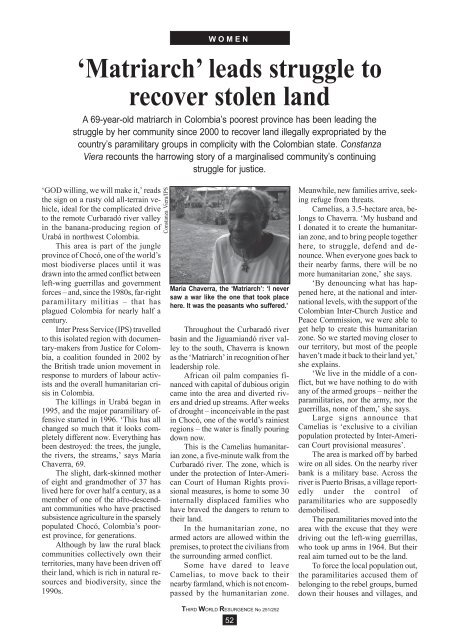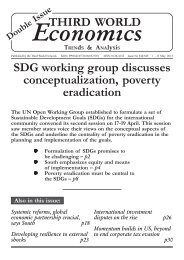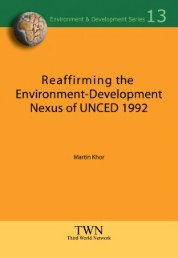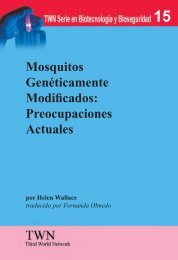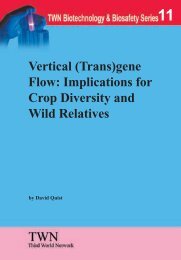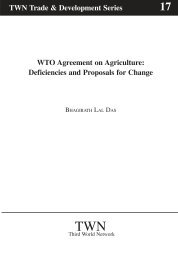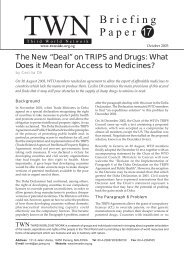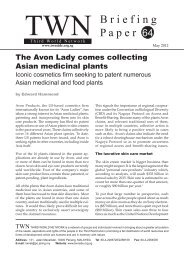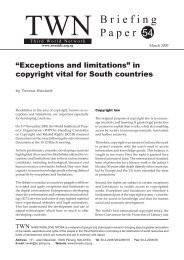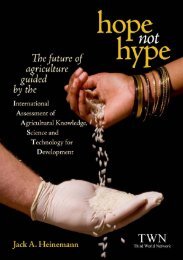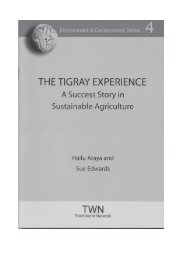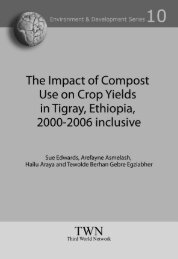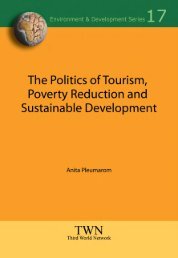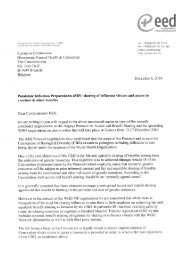The Editors - Third World Network
The Editors - Third World Network
The Editors - Third World Network
Create successful ePaper yourself
Turn your PDF publications into a flip-book with our unique Google optimized e-Paper software.
W O M E N<br />
‘Matriarch’ leads struggle to<br />
recover stolen land<br />
A 69-year-old matriarch in Colombia’s poorest province has been leading the<br />
struggle by her community since 2000 to recover land illegally expropriated by the<br />
country’s paramilitary groups in complicity with the Colombian state. Constanza<br />
Viera recounts the harrowing story of a marginalised community’s continuing<br />
struggle for justice.<br />
‘GOD willing, we will make it,’ reads<br />
the sign on a rusty old all-terrain vehicle,<br />
ideal for the complicated drive<br />
to the remote Curbaradó river valley<br />
in the banana-producing region of<br />
Urabá in northwest Colombia.<br />
This area is part of the jungle<br />
province of Chocó, one of the world’s<br />
most biodiverse places until it was<br />
drawn into the armed conflict between<br />
left-wing guerrillas and government<br />
forces – and, since the 1980s, far-right<br />
paramilitary militias – that has<br />
plagued Colombia for nearly half a<br />
century.<br />
Inter Press Service (IPS) travelled<br />
to this isolated region with documentary-makers<br />
from Justice for Colombia,<br />
a coalition founded in 2002 by<br />
the British trade union movement in<br />
response to murders of labour activists<br />
and the overall humanitarian crisis<br />
in Colombia.<br />
<strong>The</strong> killings in Urabá began in<br />
1995, and the major paramilitary offensive<br />
started in 1996. ‘This has all<br />
changed so much that it looks completely<br />
different now. Everything has<br />
been destroyed: the trees, the jungle,<br />
the rivers, the streams,’ says María<br />
Chaverra, 69.<br />
<strong>The</strong> slight, dark-skinned mother<br />
of eight and grandmother of 37 has<br />
lived here for over half a century, as a<br />
member of one of the afro-descendant<br />
communities who have practised<br />
subsistence agriculture in the sparsely<br />
populated Chocó, Colombia’s poorest<br />
province, for generations.<br />
Although by law the rural black<br />
communities collectively own their<br />
territories, many have been driven off<br />
their land, which is rich in natural resources<br />
and biodiversity, since the<br />
1990s.<br />
Constanza Viera/IPS<br />
María Chaverra, the ‘Matriarch’: ‘I never<br />
saw a war like the one that took place<br />
here. It was the peasants who suffered.’<br />
Throughout the Curbaradó river<br />
basin and the Jiguamiandó river valley<br />
to the south, Chaverra is known<br />
as the ‘Matriarch’ in recognition of her<br />
leadership role.<br />
African oil palm companies financed<br />
with capital of dubious origin<br />
came into the area and diverted rivers<br />
and dried up streams. After weeks<br />
of drought – inconceivable in the past<br />
in Chocó, one of the world’s rainiest<br />
regions – the water is finally pouring<br />
down now.<br />
This is the Camelias humanitarian<br />
zone, a five-minute walk from the<br />
Curbaradó river. <strong>The</strong> zone, which is<br />
under the protection of Inter-American<br />
Court of Human Rights provisional<br />
measures, is home to some 30<br />
internally displaced families who<br />
have braved the dangers to return to<br />
their land.<br />
In the humanitarian zone, no<br />
armed actors are allowed within the<br />
premises, to protect the civilians from<br />
the surrounding armed conflict.<br />
Some have dared to leave<br />
Camelias, to move back to their<br />
nearby farmland, which is not encompassed<br />
by the humanitarian zone.<br />
Meanwhile, new families arrive, seeking<br />
refuge from threats.<br />
Camelias, a 3.5-hectare area, belongs<br />
to Chaverra. ‘My husband and<br />
I donated it to create the humanitarian<br />
zone, and to bring people together<br />
here, to struggle, defend and denounce.<br />
When everyone goes back to<br />
their nearby farms, there will be no<br />
more humanitarian zone,’ she says.<br />
‘By denouncing what has happened<br />
here, at the national and international<br />
levels, with the support of the<br />
Colombian Inter-Church Justice and<br />
Peace Commission, we were able to<br />
get help to create this humanitarian<br />
zone. So we started moving closer to<br />
our territory, but most of the people<br />
haven’t made it back to their land yet,’<br />
she explains.<br />
‘We live in the middle of a conflict,<br />
but we have nothing to do with<br />
any of the armed groups – neither the<br />
paramilitaries, nor the army, nor the<br />
guerrillas, none of them,’ she says.<br />
Large signs announce that<br />
Camelias is ‘exclusive to a civilian<br />
population protected by Inter-American<br />
Court provisional measures’.<br />
<strong>The</strong> area is marked off by barbed<br />
wire on all sides. On the nearby river<br />
bank is a military base. Across the<br />
river is Puerto Brisas, a village reportedly<br />
under the control of<br />
paramilitaries who are supposedly<br />
demobilised.<br />
<strong>The</strong> paramilitaries moved into the<br />
area with the excuse that they were<br />
driving out the left-wing guerrillas,<br />
who took up arms in 1964. But their<br />
real aim turned out to be the land.<br />
To force the local population out,<br />
the paramilitaries accused them of<br />
belonging to the rebel groups, burned<br />
down their houses and villages, and<br />
THIRD WORLD RESURGENCE No 251/252<br />
52


